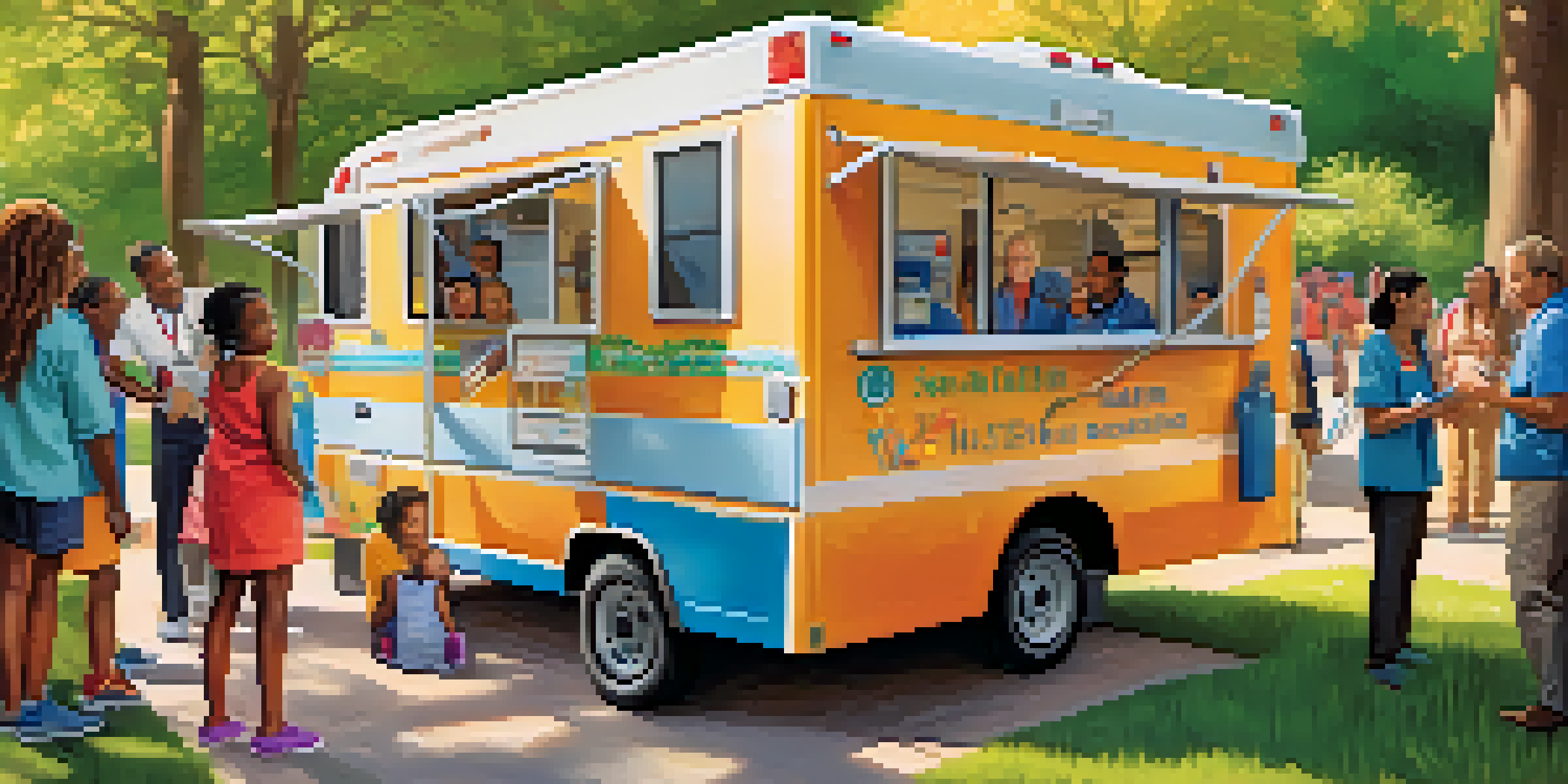Exploring Mobile Health Clinics and Their Community Benefits

What Are Mobile Health Clinics and Their Purpose?
Mobile health clinics are specialized vehicles equipped to provide medical services directly to communities. They aim to bridge the gap between healthcare providers and underserved populations, often visiting areas with limited access to traditional healthcare facilities. By bringing medical care on wheels, these clinics ensure that essential services reach those who need them the most.
The greatest wealth is health.
Typically staffed by a team of healthcare professionals, mobile health clinics offer a range of services, including vaccinations, screenings, and basic health education. Their flexibility allows them to adapt to the unique needs of different communities, whether urban or rural. This tailored approach is particularly beneficial in addressing health disparities that many face due to geographic or economic barriers.
Moreover, mobile health clinics often collaborate with local organizations and community leaders to ensure their services are relevant and accessible. This grassroots involvement fosters trust and encourages community members to seek care, ultimately promoting a healthier population.
The Growing Need for Mobile Health Clinics
The rise of chronic diseases and the increasing number of uninsured individuals highlight a critical need for accessible healthcare. Mobile health clinics are stepping in to fill this void, offering preventive care and health education to communities that might otherwise go without. As healthcare costs continue to soar, these clinics provide a cost-effective solution for both patients and the healthcare system.

Additionally, public health emergencies, like the COVID-19 pandemic, have showcased the importance of mobile clinics. They can swiftly respond to outbreaks, providing vaccinations and testing in hard-hit areas. This agility is invaluable in maintaining public health and ensuring that vulnerable populations receive timely care.
Mobile Clinics Address Health Gaps
Mobile health clinics bring essential medical services directly to underserved communities, helping to bridge the gap in healthcare access.
Ultimately, the growing demand for these services underscores the importance of innovation in healthcare delivery. Mobile health clinics represent a proactive approach to tackling health inequities, making healthcare more inclusive for everyone.
Key Services Offered by Mobile Health Clinics
Mobile health clinics provide a variety of essential services designed to meet the needs of the communities they serve. Common offerings include routine check-ups, immunizations, and screenings for chronic conditions such as diabetes and hypertension. By providing these services on-site, clinics help individuals manage their health proactively.
Health is not just about what you're eating. It's also about what you're thinking and saying.
In addition to physical health services, many mobile clinics also focus on mental health support. They often offer counseling services, screenings for depression, and resources for substance abuse. This holistic approach ensures that individuals receive comprehensive care, addressing both physical and mental health needs.
Moreover, educational workshops and health promotion activities are often part of their outreach. These initiatives empower community members with knowledge about healthy lifestyles, nutrition, and disease prevention, encouraging proactive engagement in their health management.
Mobile Health Clinics and Community Engagement
One of the standout features of mobile health clinics is their commitment to community engagement. They often work closely with local organizations, schools, and faith-based groups to build trust and understand the specific health needs of the community. This relationship fosters a collaborative environment where health services are more readily accepted and utilized.
Furthermore, by involving community members in the planning and execution of services, mobile clinics ensure that their offerings are culturally relevant and respectful. This participatory approach not only enhances service delivery but also empowers individuals, encouraging them to take ownership of their health.
Community Engagement is Essential
By collaborating with local organizations and engaging community members, mobile health clinics ensure their services are culturally relevant and widely accepted.
In essence, community engagement transforms mobile health clinics from mere service providers into integral parts of the community fabric. This connection enhances the effectiveness of their services and promotes a culture of health and wellness.
Challenges Faced by Mobile Health Clinics
While mobile health clinics offer invaluable services, they do face several challenges. Funding is often a significant hurdle, as many operate on limited budgets and rely on grants or donations. This financial instability can hinder their ability to provide consistent care and expand their reach.
Logistical issues also pose challenges, including maintaining the vehicles, managing schedules, and ensuring access to necessary medical supplies. These operational demands can impact the clinic's ability to deliver timely services, especially in areas with high demand.
Moreover, there can be stigma attached to seeking care from mobile clinics, as some individuals may perceive them as inferior to traditional healthcare settings. Overcoming these perceptions is crucial for ensuring that communities fully embrace the services offered.
Success Stories from Mobile Health Clinics
Across the country, there are numerous success stories that highlight the profound impact of mobile health clinics. In one instance, a mobile clinic in a low-income neighborhood was able to increase vaccination rates by over 50% in just a few months. This surge not only protected individuals but also contributed to community-wide immunity.
Another inspiring example comes from a mobile clinic that focused on mental health services. By offering free counseling and support groups, they significantly reduced local emergency room visits for mental health crises. This proactive approach not only saved costs but also improved the overall well-being of community members.
Challenges Hinder Mobile Health Impact
Despite their benefits, mobile health clinics face challenges such as funding issues and logistical hurdles that can limit their effectiveness.
These success stories illustrate that when communities have access to mobile health services, they can experience transformative health outcomes. They serve as powerful reminders of the potential benefits of innovative healthcare delivery models.
The Future of Mobile Health Clinics
As healthcare continues to evolve, mobile health clinics are poised to play a crucial role in shaping the future of community health. With advancements in technology, these clinics can leverage telehealth services to reach even more individuals, providing virtual consultations alongside in-person care. This hybrid model could enhance access to healthcare while maintaining the personal touch that mobile clinics are known for.
Moreover, as awareness of health disparities grows, funding and support for mobile health initiatives are likely to increase. Community leaders and policymakers are recognizing the importance of these clinics in promoting health equity, which could lead to more resources and partnerships.

In summary, the future looks bright for mobile health clinics as they continue to adapt and innovate. By focusing on accessibility and community engagement, they can ensure that healthcare is a right, not a privilege, for all.